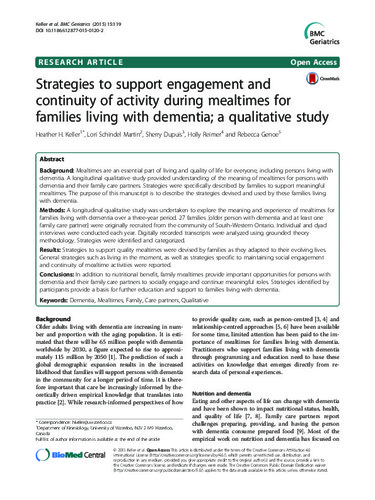| dc.contributor.author | Keller, Heather | |
| dc.contributor.author | Martin, Lori Schindel | |
| dc.contributor.author | Dupuis, Sherry L. | |
| dc.contributor.author | Reimer, Holly | |
| dc.contributor.author | Genoe, Mary Rebecca | |
| dc.date.accessioned | 2017-04-20 17:25:46 (GMT) | |
| dc.date.available | 2017-04-20 17:25:46 (GMT) | |
| dc.date.issued | 2015-10-09 | |
| dc.identifier.uri | https://doi.org/10.1186/s12877-015-0120-2 | |
| dc.identifier.uri | http://hdl.handle.net/10012/11690 | |
| dc.description | This article is distributed under the terms of the Creative Commons Attribution 4.0 International License (http://creativecommons.org/licenses/by/4.0/). Keller, H. H., Martin, L. S., Dupuis, S., Reimer, H., & Genoe, R. (2015). Strategies to support engagement and continuity of activity during mealtimes for families living with dementia; a qualitative study. BMC Geriatrics, 15(1). https://doi.org/10.1186/s12877-015-0120-2 | en |
| dc.description.abstract | Background
Mealtimes are an essential part of living and quality of life for everyone, including persons living with dementia. A longitudinal qualitative study provided understanding of the meaning of mealtimes for persons with dementia and their family care partners. Strategies were specifically described by families to support meaningful mealtimes. The purpose of this manuscript is to describe the strategies devised and used by these families living with dementia.
Methods
A longitudinal qualitative study was undertaken to explore the meaning and experience of mealtimes for families living with dementia over a three-year period. 27 families [older person with dementia and at least one family care partner] were originally recruited from the community of South-Western Ontario. Individual and dyad interviews were conducted each year. Digitally recorded transcripts were analyzed using grounded theory methodology. Strategies were identified and categorized.
Results
Strategies to support quality mealtimes were devised by families as they adapted to their evolving lives. General strategies such as living in the moment, as well as strategies specific to maintaining social engagement and continuity of mealtime activities were reported.
Conclusions
In addition to nutritional benefit, family mealtimes provide important opportunities for persons with dementia and their family care partners to socially engage and continue meaningful roles. Strategies identified by participants provide a basis for further education and support to families living with dementia. | en |
| dc.description.sponsorship | Research funding support was provided by the Alzheimer Society of Canada and the Social Sciences and Humanities Research Council. | en |
| dc.language.iso | en | en |
| dc.publisher | BioMed Central | en |
| dc.rights | Attribution 4.0 International | * |
| dc.rights.uri | http://creativecommons.org/licenses/by/4.0/ | * |
| dc.subject | Dementia | en |
| dc.subject | Mealtimes | en |
| dc.subject | Family | en |
| dc.subject | Care partners | en |
| dc.subject | Qualitative | en |
| dc.title | Strategies to support engagement and continuity of activity during mealtimes for families living with dementia; a qualitative study | en |
| dc.type | Article | en |
| dcterms.bibliographicCitation | Keller, H. H., Martin, L. S., Dupuis, S., Reimer, H., & Genoe, R. (2015). Strategies to support engagement and continuity of activity during mealtimes for families living with dementia; a qualitative study. BMC Geriatrics, 15(1). https://doi.org/10.1186/s12877-015-0120-2 | en |
| uws.contributor.affiliation1 | Faculty of Applied Health Sciences | en |
| uws.contributor.affiliation2 | Recreation and Leisure Studies | en |
| uws.typeOfResource | Text | en |
| uws.peerReviewStatus | Reviewed | en |
| uws.scholarLevel | Faculty | en |


